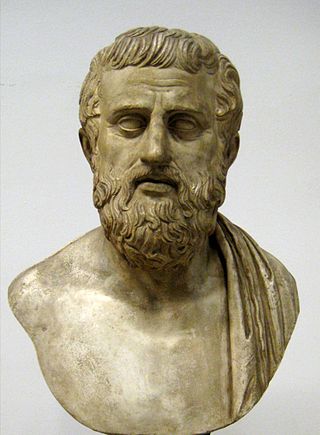
Sophocles was an ancient Greek tragedian, known as one of three from whom at least one play has survived in full. His first plays were written later than, or contemporary with, those of Aeschylus; and earlier than, or contemporary with, those of Euripides. Sophocles wrote over 120 plays, but only seven have survived in a complete form: Ajax, Antigone, Women of Trachis, Oedipus Rex, Electra, Philoctetes and Oedipus at Colonus. For almost fifty years, Sophocles was the most celebrated playwright in the dramatic competitions of the city-state of Athens which took place during the religious festivals of the Lenaea and the Dionysia. He competed in thirty competitions, won twenty-four, and was never judged lower than second place. Aeschylus won thirteen competitions, and was sometimes defeated by Sophocles; Euripides won four.
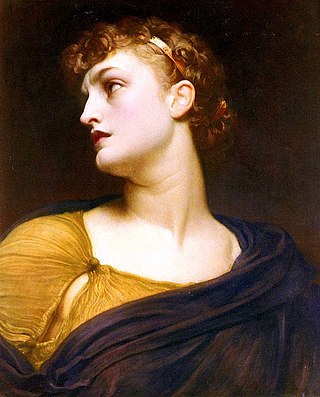
In Greek mythology, Antigone is a Theban princess and a character in several ancient Greek tragedies. She is the daughter of Oedipus, king of Thebes, and either his mother Jocasta or, in another variation of the myth, Euryganeia. She is a sister of Polynices, Eteocles, and Ismene. The meaning of the name is, as in the case of the masculine equivalent Antigonus, "in place of one's parents" or "worthy of one's parents". Antigone appears in the three 5th century BC tragic plays written by Sophocles, known collectively as the three Theban plays, being the protagonist of the eponymous tragedy Antigone. She makes a brief appearance at the end of Aeschylus' Seven against Thebes, while her story was also the subject of Euripides' now lost play with the same name.
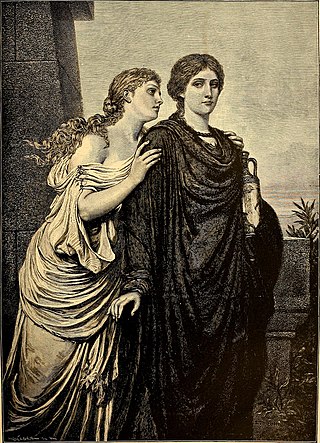
In Greek mythology, Ismene is a Theban princess. She is the daughter and half-sister of Oedipus, king of Thebes, daughter and granddaughter of Jocasta, and sister of Antigone, Eteocles, and Polynices. She appears in several tragic plays of Sophocles: at the end of Oedipus Rex, in Oedipus at Colonus and in Antigone. She also appears at the end of Aeschylus' Seven Against Thebes.
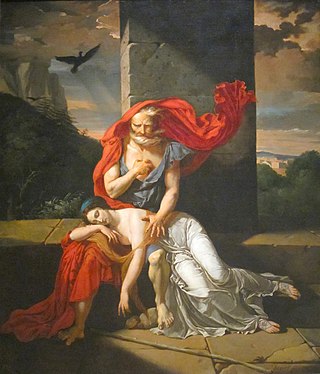
Oedipus at Colonus is the last of the three Theban plays of the Athenian tragedian Sophocles. It was written shortly before Sophocles's death in 406 BC and produced by his grandson at the Festival of Dionysus in 401 BC.

Paul Muldoon is an Irish poet. He has published more than thirty collections and won a Pulitzer Prize for Poetry and the T. S. Eliot Prize. At Princeton University he is currently both the Howard G. B. Clark '21 University Professor in the Humanities and Founding Chair of the Lewis Center for the Arts. He held the post of Oxford Professor of Poetry from 1999 to 2004 and has also served as president of the Poetry Society (UK) and Poetry Editor at The New Yorker.

Robert Stuart Fitzgerald was an American poet, literary critic and translator whose renderings of the Greek classics "became standard works for a generation of scholars and students". He was best known as a translator of ancient Greek and Latin. He also composed several books of his own poetry.
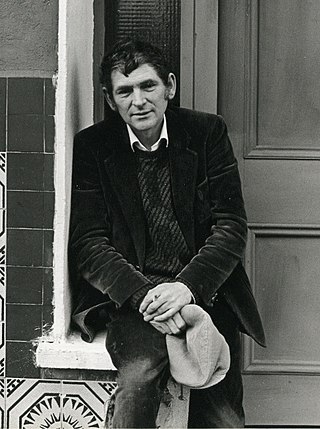
Michael Hartnett was an Irish poet who wrote in both English and Irish. He was one of the most significant voices in late 20th-century Irish writing and has been called "Munster's de facto poet laureate".
Robert Calverl(e)y Trevelyan was an English poet and translator, of a traditionalist sort, and a follower of the lapidary style of Logan Pearsall Smith.
Timothy Brendan Kennelly, usually known as Brendan Kennelly, was an Irish poet and novelist. He was Professor of Modern Literature at Trinity College Dublin until 2005. Following his retirement he was a Professor Emeritus at Trinity College.
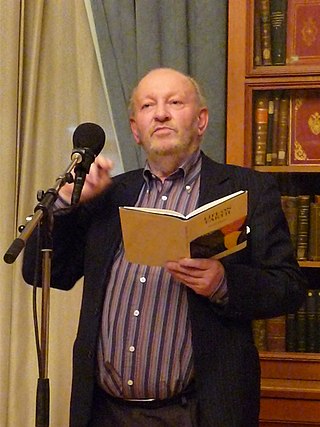
Derek Mahon was an Irish poet. He was born in Belfast, Northern Ireland but lived in a number of cities around the world. At his death it was noted that his, "influence in the Irish poetry community, literary world and society at large, and his legacy, is immense". President of Ireland Michael D Higgins said of Mahon; "he shared with his northern peers the capacity to link the classical and the contemporary but he brought also an edge that was unsparing of cruelty and wickedness."
Pádraig de Brún, also called Patrick Joseph Monsignor Browne, was an Irish clergyman, mathematician, poet, and classical scholar, who served as President of University College, Galway (UCG). He was also known in friendly informal circles as Paddy Browne.

Saadi Youssef was an Iraqi author, poet, journalist, publisher, and political activist. He published thirty volumes of poetry in addition to seven books of prose.

Anthony Dey Hoagland was an American poet. His poetry collection, What Narcissism Means to Me (2003), was a finalist for the National Book Critics Circle Award. His other honors included two grants from the National Endowment for the Arts, a 2000 Guggenheim Fellowship in Poetry, and a fellowship to the Provincetown Fine Arts Work Center. His poems and criticism have appeared in such publications as Poetry Magazine, Ploughshares, AGNI, Threepenny Review, The Gettysburg Review, Ninth Letter, Southern Indiana Review, American Poetry Review and Harvard Review.
Linda Alouise Gregg was an American poet.

John Jordan (1930–1988) was an Irish poet and short-story writer.
Edward Arthur Henry Pakenham, 6th Earl of Longford was an Irish peer, politician, and littérateur. Also known as Eamon de Longphort, he was a member of the fifth Seanad Éireann, the upper house of the Irish Parliament, in the 1940s.
Graywolf Press is an independent, non-profit publisher located in Minneapolis, Minnesota. Graywolf Press publishes fiction, non-fiction, and poetry.

Anthony Stephen Knowland was a professor of English literature, specialising in the work of W.B. Yeats, William Shakespeare and classical Greek literature. Apart from his passion for literature, he loved music, was an accomplished pianist, and an enthusiastic cook. A gentle, unassuming person, humorous, warm and kind, he was a committed humanist and pacifist. He had no truck with status, celebrity or power.
Gallery Press is an independent Irish publishing company, publishing Irish poetry, drama, and prose by contemporary Irish writers. Founded by poet Peter Fallon as the Gallery Books imprint of Tara Telephone Publications, itself an offshoot of a beat poetry performance group, it has released more than 400 books by a wide range of artists.
Ciaran O'Driscoll is an Irish poet and novelist born in Callan, County Kilkenny and living in Limerick.











